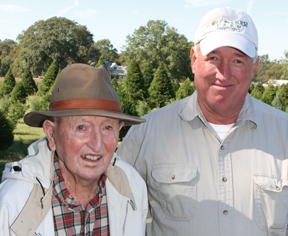From Cotton To Christmas: It’s A New Day At Old Baker Farm

His memory isn’t what it once was, 100-year-old Earl Baker will tell you. But he remembers a time when the fields surrounding his Harpersville farm were covered in a white blanket. But the fluffy white stuff wasn’t snow — it was cotton.”We didn’t know anything but cotton (but) we’ve done quit the cotton it looks like,” he says with a slow, deliberate sweep of his arm. “Where all these pines are now used to be cotton.””These pines” are actually 18 acres of Christmas trees, trees that have become the star attraction of Baker’s old farm each year from the first Friday after Thanksgiving until Christmas Eve.That’s because Old Baker Farm, as it is officially known now, is one of those working farms where kids spill out of school buses by the hundreds to see what farm life is all about. They come for Farm Day Camp in the summer, the corn maze and pumpkin patch in the fall and the Cotton Pickin’ Celebration in late October.But Christmas? Ahhh, Christmas. That’s when they come to sip apple cider, munch on kettle corn, write Santa (and maybe even sit on his knee), ride a horse or take a hayride through the rows of Christmas trees, picking one out to take home and decorate.Today, it’s Jerry Baker, Earl’s son, who runs the farm that last year was designated as a Century and Heritage Century Farm, meaning it has been continuously operated as a family farm for at least 100 years.”My granddaddy bought the place in 1902, and my great granddaddy came here in 1899,” said Jerry. “When he bought the place, they told him it was over 100 years old then. So that would have put it in the 1790s at least.”Back in the 1940s, Earl Baker added poultry to the farm’s mix. In all, he built 48 chicken houses — every last one of them by his own hand — and turned the farm into one of the state’s top egg producers with 18 fulltime employees.”Then they started hollering, ‘Cholesterol! Eggs are bad for you!’ That was in ’76 and ’77. We lost a lot of money. It put us out of business. Dad made the call. He said, ‘We’ve got to quit.’ He’d had eggs since the ’40s. So we quit.”Cotton, however, stayed awhile longer, reaching as much as 1,300 acres at one point. “But I don’t think we made but about 20 bushels,” Jerry said.Slowly but surely, he began scaling back on the cotton. “I’ve got three daughters and I had to start doing something to get them ready for college, and I just wasn’t making enough money row cropping,” Jerry said. “There were already a lot of people who were coming out this way to another Christmas tree farm that was going out of business. I looked at what they were doing, and I said, ‘Well, I think I can do it and make it work.'”Now, he only plants about 15 acres of cotton, and opens it up for kids to pick during the Cotton Pickin’ Celebration.After the celebration, he brings in the combine and harvests about two bales per acre. Then, it’s time to begin thinking about the Christmas rush, which begins the day after Thanksgiving.”I’ll sell anywhere from 1,000 to 1,400 trees, but that’s been built up over a long period of time,” says Jerry. “Now it looks like we’ve reached a point where we can’t get over the hump. It’s just sort of leveled out.””People are trendy,” Jerry adds. “They’ll say, ‘Well, I’m tired of messing with a real tree. Let’s just put up an artificial one.’ Then, they think ‘I’ve got to use this thing until we wear it out.’ Then, they’ll switch back and forth: ‘I like a Northern tree. I like a Frasier fir. I’d like a blue spruce.'”Trendiness can be costly, however. According to the National Christmas Tree Association, 85 percent of all artificial trees come from China. The NCTA also notes that artificial trees are a petroleum-based product, are not biodegradable and remain in landfills for centuries after disposal. The average life span of an artificial tree is only six years.Jerry Baker says competition from artificial trees is bad enough, but says the large hardware chains that ship in trees are also hurting Christmas tree farmers in Alabama. “I don’t think those trees are what they make ’em out to be, but I can’t sell them that cheap,” he says. “If I did that, I’d definitely be out of business. But we can compete well against the Northern trees.”Earl Baker, meanwhile, takes a look at all the trees and remembers his days growing up as one of 14 children on this farm. “I found our Christmas tree out in the woods while I was hunting. I would find it and go back and get it at Christmas,” he says. “It’s supposed to be cotton here!”For more information, visit www.OldBakerFarm.com, email info@OldBakerFarm.com or call (205) 672-7209.
